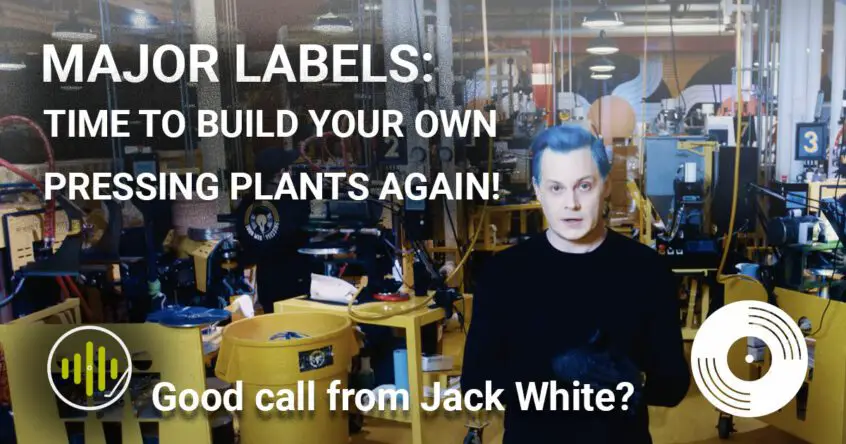In a recent video and statement, Jack White calls on major labels to build their own pressing plants once again.
His plea comes at a moment in time where demand for vinyl records continues to grow year on year, but the capacity for production remains rudimentary and pushed to the limit.
In his statement, he claims, “At least once a week, without fail, someone will reach out asking me to help expedite their vinyl record manufacturing. It’s a natural thought… knowing that I own a pressing plant and have my own record label, “if anyone could help, it’s this guy!”
Jack White is a long-term advocate and ambassador for the vinyl format, having declared his love for the format in several interviews. As a result, he is one of the most quotable musicians when it comes to famous statements about vinyl records.
In 2017, White put his money where his mouth is and opened his pressing plant (Third Man Pressing) using his own money. The plant, he claims, is “…a plant which has always been open to anyone and everyone who walks in the door and wants to press a record, from bedroom hip hop artists to field recording documentarians.”
White opened Third Man Pressing as a sign of commitment to the vinyl format, but also, it would seem, to help play a small part in alleviating the frustrating production lead times associated with releasing a record.
As things stand, small independent artists and labels can expect to wait eight to ten months for their records. Clearly, such a huge bottleneck in the production process is causing unacceptable logistical problems across the industry, and as White suggests, something needs to be done.
By definition, large major labels, such as Universal, Sony, and Warner Brothers have a huge amount of material to release compared with independent artists and smaller labels. On top of this, the major’s also have a gigantic back catalog and a seemingly unlimited demand for re-issues of classic albums.
When the amount of pressing plants globally doesn’t match the unprecedented demand for vinyl records, it’s little wonder major labels are contributing a significant amount to the strained infrastructure.
All this, of course, is before we even consider the additional bottleneck of lacquer production (the blank discs used by mastering engineers to create a master disk ready for record production).
There are only a very small number of companies that produce these disks globally. The already limited supply was put under additional strain back in February 2020 when lacquer producer Apollo Masters tragically burnt to the ground.
Since this tragedy, the industry has recovered and managed to sustain a supply of lacquers. However, the overall production supply chain remains strained, as White suggests.
Keen to re-emphasize that his pledge is about the greater benefit of the entire industry, White also clarified the sentiment behind his pledge with the following caveat:
“To be clear, the issue is not big labels versus small labels, it’s not independent versus mainstream, it’s not even punk versus pop. The issue is, simply, we have ALL created an environment where the unprecedented demand for vinyl records cannot keep up with the rudimentary supply of them.”
Imagine how much of a difference it would make if some of the strain on a limited number of vinyl pressing plants was alleviated by major-label run production facilities? I really think Jack White is on to something here.
Such a huge amount of pressure on an increasing—but still inadequate amount of pressing plants—is undoubtedly contributing to the growing frustrations of consumers concerning vinyl quality control.
Therefore, I would conclude, as Jack White suggests, it’s in the interest of the industry as a whole (including the major labels) for them to get fully behind vinyl.
We’ve seen year-on-year growth for a decade or more. Vinyl isn’t a fad; it’s not going anywhere. This isn’t the high-risk venture it perhaps was ten years ago.
I concur; it’s time the major labels contributed by starting to build their own pressing plants once again.
What do you think about Jack White’s plea to the major record labels? Let us know in the comments below.




I believe the major labels are missing out on a huge opportunity. I don’t know how many times I have wanted to purchase a classic album only to find out it has been discontinued. Only to have to resort to looking for a used one which in itself can be risky not to mention some of the ridiculously high prices they ask. I believe there is a great demand in reissues alone. I have to wonder how smart the people who run these labels really are when there is a huge business opportunity staring them in their collective faces, ready to be taken advantage of and they are just sitting on their asses seemingly oblivious to this??
Great idea, wish it would happen. The U.S. needs more homegrown manufacturing also. As someone who collected albums when they cost under $5.00, the cost of vinyl albums now is shocking. So won’t an enterprising young person figure out a way to make this happen. The majors have never done anything for consumers and I doubt they will now esp. since the artists are no longer slaves.
I applaud Jack White’s comments, absolutely. However, for the major labels to make this happen, either of two things would probably occur: The consumer would pay the price of record plant construction by way of higher record prices imposed by the labels, or the CEOs of the labels would have to take a pay cut to offset construction costs. I see the former rather than the latter happening, quite honestly.
Jack White makes a strong argument for more pressing plants. But is it relcutance by large record companies to keep vynl recordings at an artificially high price.